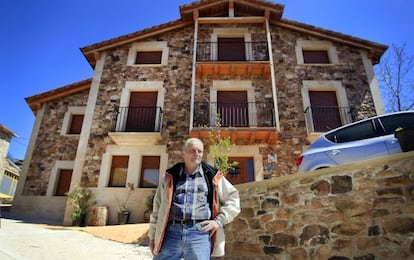The jewel and the headache
Tourist lodge that cost 400,000 euros converted village into Spain's most indebted


From the window above the roofs of the houses in the village you can see the thousands of oak trees that cover the valley of Valladares. José Luis María, the Popular Party mayor of Monasterio de la Sierra in the province of Burgos since July 2011 says: "This, with the colors of fall, is wonderful." This is the panorama from one of the windows of the country lodge called La Casa del Toro (the House of the Bull). It was opened on September 26, 2011 and is owned by the town hall. There is a plaque on the door indicating that the lodge cost 408,000 euros to build.
This sum has caused the village to become the most indebted local corporation in Spain per capita: 8,891 euros for each of its 48 inhabitants. The figure is 12 times the average debt of town halls per inhabitant in Spain of 744 euros.
The villagers did not have to foot the entire bill for its construction, with 29.7 percent paid for by aid from the European Union, the central government and the regional administration of Castilla y Léon. The rest was financed with a loan from the state-owned Instituto de Crédito Oficial (ICO). The village's total budget for last year was 105,000 euros, more than half of which came from the provincial council. Most of the local authority's funding comes from the exploitation of communal forests.
The country lodge occupies 600 square meters and has six double bedrooms. It started to receive guests from March of last year despite the building not being fully finished. The walls of the attic remain unpainted and the floor is covered in cardboard, contrasting with the aroma of newness in the rest of the house. "We want to make a lounge area out of this," the mayor says. Despite the cost, he is proud of La Casa del Toro. "The house is our jewel, and also our biggest headache."
The 58-year-old mayor is a man with deep blue eyes who works as a cabinet maker. "We have all this debt, but it's not real," he says. Monasterio has 15 years to pay back the loan, which has a five-year exemption period and an annual interest rate of 0.5 percent. "I don't feel like I am in debt," María adds. "I'm quite calm about this."
Young people don't want to look after cattle; Monasterio needs a future"
The house has only been let so far "to people we know," the mayor says. The lodge is only rented as a whole for 200 euros a night. The local council took in 5,000 euros in rent last year, but the arrangement is not profitable. "I don't think any country lodge is profitable nowadays," the mayor says. Under the terms of the official assistance the village received to build the house, the local council is obliged to hire someone to look after it whether or not it is occupied.
Monasterio's big hope lies about four kilometers away in the Valladares river. An immense cableway stretches across the valley pointing to where work on the Castrovido dam is taking placing. The dam was initially planned in the 1960s but delayed because of a clash of interests between, on the one hand, finding a solution to regular flooding in the Arlanza basin, and on the other, protecting the wilderness area of the Demanda mountain range. After a debate lasting three decades work on the dam eventually got underway.
According to Jesús María, the former mayor of Monasterio from 2003 to 2011 (he is not related to his successor), the moment was right to try and attract tourists. "The regional government told us that the reservoir created by the dam would enhance the attractiveness of the area," he says. The village will also receive compensation for the areas that are flooded. The former mayor said the local council decided to go ahead and build the lodge on its own after failing to attract private investors, something to which the village "has always been open." The 48-year-old María said the lodge was needed to bring life to the village. "Young people don't want to carry on looking after cattle. Monasterio needs a future."
However, there was an unfortunate twist to the plan. Ten days after the rural lodge was opened, there was an accident at the dam site in which four workers were killed. Work on the project was frozen and has yet to be renewed.
Paradoxically, the rains this winter might have helped save the project. The Arlanza area flooded twice and according to the president of the Hydrographic Confederation of the Duero, José Valín, work on the dam will continue "depending on the availability of funding." However, he says it is "impossible" the project will be finished before 2016, when the Monasterio local council is due to make the first payment of 42,000 euros on the loan it took out to build the lodge. "The logical thing would be for the dam project to be finished at the start of 2017," said Valín.
The local council will not receive money from the land that has been flooded by the dam until the reservoir is full, but that does not worry the current mayor. "We have 200,000 euros to tide us over if the dam is delayed and we can also call on the provincial council for help."
According to Rafael Bañón, the director of the Master's program in Governance and Local Administration at the Complutense University of Madrid (UCM), the debt taken on by Monasterio, although common in Spain, is "madness."
"There is little control over local governments," he says. Bañón notes that the atomization of Spain into 8,116 local corporations makes most of them economically unviable. "A municipality of 50 inhabitants does not have the capacity to invest, and in many cases, even to provide services," he says.
If the inhabitants of Monasterio have, or had, doubts about whether building the lodge was a good idea or not they are keeping them to themselves. In fact they are all full of praise for the house. "What's important now is that they help us pay the debt," says one of the inhabitants, Nicolás García. "What happened in the past doesn't help anyone."
Tu suscripción se está usando en otro dispositivo
¿Quieres añadir otro usuario a tu suscripción?
Si continúas leyendo en este dispositivo, no se podrá leer en el otro.
FlechaTu suscripción se está usando en otro dispositivo y solo puedes acceder a EL PAÍS desde un dispositivo a la vez.
Si quieres compartir tu cuenta, cambia tu suscripción a la modalidad Premium, así podrás añadir otro usuario. Cada uno accederá con su propia cuenta de email, lo que os permitirá personalizar vuestra experiencia en EL PAÍS.
¿Tienes una suscripción de empresa? Accede aquí para contratar más cuentas.
En el caso de no saber quién está usando tu cuenta, te recomendamos cambiar tu contraseña aquí.
Si decides continuar compartiendo tu cuenta, este mensaje se mostrará en tu dispositivo y en el de la otra persona que está usando tu cuenta de forma indefinida, afectando a tu experiencia de lectura. Puedes consultar aquí los términos y condiciones de la suscripción digital.








































